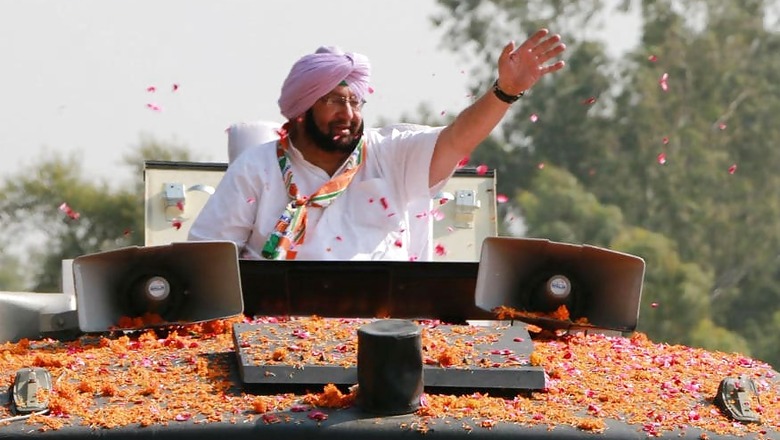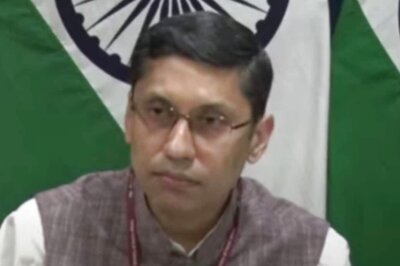
views
Punjab’s debt burden, at nearly 1.9 lakh crore, matches the margin of victory in the Gurdaspur bye-election — 1.9 lakh votes. Neither the amazing grace of victorious Congressman Sunil Jakhar, nor the BJP’s overlooking Vinod Khanna’s widow, nor Punjab chief minister Amarinder Singh’s extended honeymoon with the electorate, can explain the punishing blow dealt to the ruling party in Gurdaspur. ‘It’s the economy, stupid’, to borrow the catchphrase of Bill Clinton’s 1990 campaign.
A loan waiver for one million farmers in the backdrop of spiralling rural debt, continuing suicides by farmers and a deepening water crisis, may explain why Jakhar romped home with an unprecedented margin. Punjab’s economy is sinking and the state’s electorate has pinned its hopes of revival on the redoubtable duo of chief minister Captain Amarinder Singh and finance minister Manpreet Singh Badal.
In political terms, Gurdaspur has sent clear signals to all the players. For the BJP, it has once again red-flagged its two-decade-old alliance with the Shiromani Akali Dal (SAD).
The string of reverses in Punjab, starting with the shock defeat of stalwart Arun Jaitley in Amritsar, followed by the decimation of the NDA in the state assembly polls earlier this year and crowned by the bye-election result, is a clear indication that the SAD has become a liability. The BJP’s most prominent face in Punjab, Navjot Singh Sidhu, was forced into the welcoming embrace of the Congress on the eve of the Assembly polls, thanks to his differences with the SAD’s first family, the Badals.
The original premise of the SAD-BJP alliance — a social coalition of landed peasantry and traders and bankers — still makes sense, as it did in the late 1960s (Jan Sangh-SAD). In the 1990s, the refurbished alliance also furthered the marginalization of radical forces and the shift in agenda towards communal harmony.
The realities on the ground have changed, however. The SAD’s Jat Sikh-dominated discourse has not adapted to Dalit aspirations. Punjab has the highest scheduled caste population of any state in India, at around 32 per cent. Most of them are in rural areas and have a disproportionate share of marginal holdings and BPL status. This economically disadvantaged section is finding a political voice.
The BJP must also consider the fact that the Jat Sikh vote, always split between SAD and Congress, has swung towards the latter after ten years of NDA rule and the economic downturn. Gurdaspur, incidentally, has an SC population of around 25 per cent and a strong Christian presence (over 7 per cent and rising). It is to the late Vinod Khanna’s credit that he managed to hold on to the constituency for four terms, losing only once, in 2009. Jakhar elegantly mitigated the sympathy factor by visiting his widow, Kavita Khanna, before the election. She had failed to secure the BJP ticket, apparently because a pre-poll survey questioned her winnability.
For the good Captain, Gurdaspur puts him firmly in control of the Punjab Congress. His one-time chief rival and former Gurdaspur MP, Partap Singh Bajwa, currently in the Rajya Sabha, was keen that his wife get the ticket. In setting aside his claim in favour of party chief Sunil Jakhar, the CM was taking the risk of a disgruntled Bajwa playing spoiler. But the gamble paid off spectacularly.
On the other hand, he faces what appears to be the almost insurmountable challenge of scripting a turnaround in Punjab’s economy. Competitive populism will not serve. Earlier this year, finance minister Badal made a clean breast of the state’s financing with a ‘white paper’ spelling out the total outstanding debt — a staggering Rs 1.87 lakh crore, including an informal debt of Rs 4,435 crore, raised without the approval of the Centre. Add state guarantees and the debt is more than Rs 2 lakh crore.
A telling indicator of fiscal mismanagement are liabilities of over Rs 13,000 crore for various schemes, subsidies, bills and dearness allowance. A debt of Rs 31,000 crore was incurred for foodgrain procurement, resulting in an annual debt-servicing outgo of Rs 3,240 crore. If the Centre does not come to Punjab’s aid and take a sympathetic view by waiving interest, the state will go under. Realty rates in the state have been in free fall for the last three years, as much as 30 to 45 per cent.
Equally disastrous is the ecological impact of the green revolution. In terms of groundwater, 112 of the 138 blocks in the state are overexploited. The profligate use of water continues even as the power subsidy to farmers touches Rs 10,000 crore. The Congress government has made it clear that the counter-productive subsidy will continue, despite the impact on the state’s water resources and its finances.
Currently, the Captain is in a honeymoon phase. Even the corruption scandal in which his irrigation minister is embroiled has not had an electoral impact, given the rapacious administration which preceded it. He has also bought goodwill through the recent loan waiver and by going easy on farmers on the crop-burning issue, but these are temporary measures. Farmers must be delivered from the rising cost of farm inputs and rural debt, jobs must be created and the pressure on land eased; a business as usual approach will inexorably turn the tide against him.
Last but not the least, the Aam Admi Party has been reduced to a non-player. The grassroots support it had garnered among the have-nots melted away, not merely because of fault-lines in the organization or lack of a credible Jat Sikh face, but because it clearly does not understand the sensitivities of the state. It must serve as a constructive opposition and focus on economic issues, without making the silly errors it did in the run-up to the Assembly elections.
All Punjab wants is good governance, for a change.
(The writer is a senior journalist. Views are personal)



















Comments
0 comment